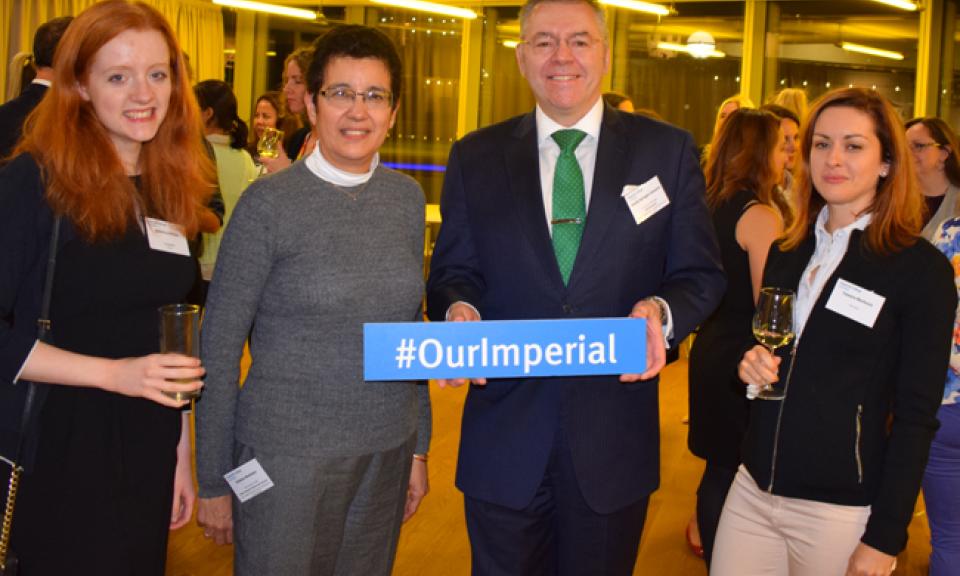
“Unconscious bias is a natural process and we all do it,” according to Dr Pete Jones a Chartered Psychologist and a Chartered Scientist who specialises in research and consultancy around our unconscious biases*. “Unconscious biases are simply our unintentional people preference.”
Dr Jones was speaking at the Imperial Women’s Network seminar organised as part of a programme of events by the Network on the theme of ‘Growth’. The Network were delighted to welcome Dr Jones, who presented to an audience of over 60 Imperial College and Business School alumni, students and guests.
Describing the difference between our conscious and unconscious Dr Jones highlighted the speed at which our unconscious makes connections and processes information, as well as relying on intuition. This is in contrast to the slower processing power and more rule driven nature of our conscious mind, which has a finite limit on what it can compute at any one time. This means that our unconscious is continuously processing data, hard-wring our brains and categorising people, while our conscious remains unaware. “This enables us to make rapid decisions about people without having to engage the limited resources of the conscious mind, which are required for more complex cognitive tasks such as problem solving and planning.” "Implicit biases develop and are maintained from our culture, our experiences and from the media we absorb. Being bias is part of who we are, we are ALL biased and have a bias blind spot.[1]"
The problem with this comes when we need to make decisions, Dr Jones explains, especially as “biases are easily triggered under cognitive or emotional load”.
“Commonness leads to comfort, which leads to trust and some people being seen as more competent.” This is known as affinity bias – an inclination to prefer people who are similar to us, for example a similar social background, gender, accent, education, ethnicity etc. We therefore tend to favour them by listening to them more, giving preferential treatment in the workplace and in selection and recruitment.
Dr Jones talked through some of the many studies that have been done which demonstrate our propensity to favour tall people, especially men, to trust and like attractive people more and the earnings impact attributed to weight.
There are many effects of unconscious bias, both good and bad, but the good news is that there are ways to challenge these:
- Get tested – gain insights into our personal biases, so you can challenge them more easily
- Have contact – positive contact with people from groups for who you may have a bias helps to undo some of that hard-wiring
- Use role models – remember people who have impressed us
- Counter stereotypes – remind yourself of statements which oppose the stereotype
- Perspective taking – try to see things from a different point of view
- Avoiding reinforcement – recognise what external factors reinforce your biases and avoid them
- Avoid triggers – try not to make decision when you are stressed, tired, hungry or anxious
- Slow down at key times – just taking a step back can slow down our unconscious
- Challenge – challenge bias when you see it in action
There are also simple ways that organisations can challenge this in the workplace including reviewing processes, holding people accountable for decisions, training, testing and ensuring leaders set the standards.
After his presentation Dr Jones opened up questions from the floor, which led to interesting discussion around whether the idea of unconscious bias is there to excuse conscious bias. There was also discussion around challenging bias when you are on the receiving end. However as Dr Jones said, it is very hard to mitigate yourself as you are not the one with the bias! You should see allies who will argue your corner.
Feedback from attendees included: “This is exactly the sort of event the network should be holding. It was an engaging presentation with practical tips.” And from Qiongwen Kang (Imperial College alumna), “This event was an excellent opportunity for us to meet, support and inspiring each other.”
In summing up Dr Jones used a quote from Professor Trish Devine: "There are no bad people, just bad thinking habits. Unconscious bias is a thinking habit we have learned and which we can unlearn."
Our thanks to the Imperial Women’s Network, EY Women’s Network who hosted us and Dr Pete Jones. The Imperial Women’s Network run events throughout the year.
*Dr Jones has provided training in unconscious bias for The Royal Society, the universities of; Edinburgh, Manchester, Cambridge, Sheffield and London (Imperial and Queen Mary’s) as well as some of the UK’s largest banks, law firms and engineering companies. Pete speaks nationally and internationally on bias management. He is the author of Implicitly®, believed to be the first commercial psychometric test to measure our hidden biases and is one of the Runnymede 360 emerging leaders in race equality.
[1]Pronin (2002)
